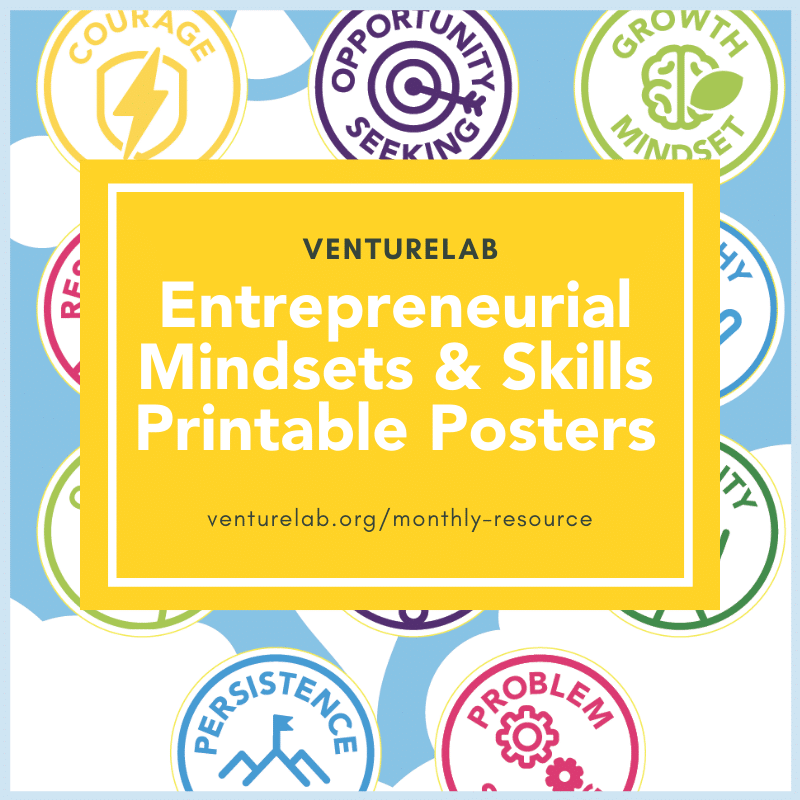VentureLab’s mindsets and skills have helped educators and youth all over the world inspire learners to think about entrepreneurship (and themselves as entrepreneurs!) in a brand new way. You can explore and share them with our Entrepreneurial Mindsets and Skills page, available in 8.5″x11″ and 18″x24″ poster size!
When students, particularly girls, are exposed to entrepreneurial thinking, a profound change takes place. They become aware of opportunities around them. They think more critically and creatively. The result: they become more confident and experimental in their ability to problem-solve and tackle challenges. Entrepreneurship isn’t just about starting companies; it is a skillset and a way of thinking. It involves identifying needs, brainstorming creative solutions, innovating, and taking calculated risks. In short, it’s about having a vision and making it a reality!
Anyone can be entrepreneurial in their own way (think back to that summer you spent selling lemonade as a kid!). For example, artists and doctors may open their own gallery or practice. Teachers have to find the right resources for their classroom. Some Girl Scouts find innovative ways to sell cookies through online platforms. And even within companies, innovation is necessary in order to stay competitive!
That’s why we believe that learning and practicing entrepreneurship starts with nurturing an entrepreneurial mindset. This includes the ability to be confident and creative, to learn from failure, and to work well with others to bring your ideas to life.
The VentureLab entrepreneurial curriculum directly and indirectly teaches the critical skills and mindsets of an entrepreneur, helping kids to see themselves as tomorrow’s entrepreneurial leaders, regardless of what career path they choose!
VentureLab Entrepreneurial Mindsets
- Curiosity: Always ask “why?” and “what if…” to seek new and creative ways of learning and doing.
- Growth mindset: Recognize your potential to learn and accomplish anything you work hard to achieve
- Courage: Dare to step out of your comfort zone to accomplish great things
- Persistence and grit: Learn to work through failure to create solutions for the problems you are passionate about
- Opportunity seeking: Actively observe, identify, and act on circumstances where you can innovate or solve a problem
- Problem solving: Proactively develop creative solutions to the problems around you
- Embracing failure: Learn to work through difficult moments and view failure as an opportunity to grow and learn something new
- Optimism: Be confident and hopeful in your ability to innovate and your potential for making an impact
- Resourcefulness: Develop quick and clever ways to overcome challenges (and don’t worry, you can always iterate!)
- Empathy: Think about other people’s needs and feelings keeping these in mind when solving a problem
- Adaptability: Make smart changes when challenges arise without losing heart or giving up
VentureLab Entrepreneurial Skills
- Creativity: Being bold and imaginative and not limiting your thinking to what’s already done
- Teamwork: It’s rare for someone to accomplish things alone. Seek out teams with diverse perspectives, skills, and talents
- Public speaking: When you have opportunities to speak about your idea, you want to do so as effectively as possible (this takes practice!)
- Idea generation: The key to innovation is to let your mind spread its wings and fly. The more ideas the better, wild and silly ideas welcome!
- Opportunity analysis: Entrepreneurs look for different patterns and trends to see if an idea will be successful and if it’s the right time to get started
- Market research: It’s important to gather information about your potential users so you can turn your ideas into something they will want
- Design thinking: To develop effective solutions, entrepreneurs need to put the user first and seek out feedback in order to design with uses in mind
- Prototyping: Entrepreneurs create prototypes–simple models to explain their idea, get feedback, and learn how their product can be improved
- Business model: Business models help answer questions like: What will it cost to make your product? What should you change?
- Pitching: Rallying people around your idea is critical! Effective “pitches” to potential users and investors are clear, short, and persuasive





